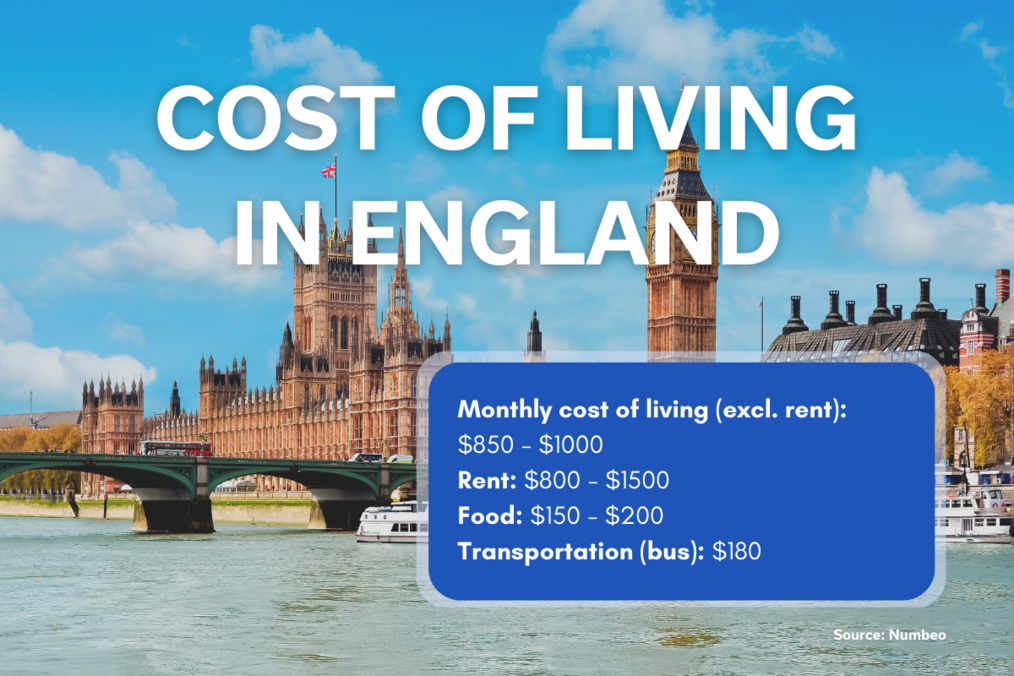
How Much Does it Cost to Study Abroad in England?
England is a popular study abroad destination for students all over the world. Check out our handy guide to learn about the various costs associated with studying abroad in England.

You've decided you want to study abroad in England, home to some of the most iconic historical sites, cities, and of course, universities in the world. This country will challenge you academically and culturally, with the added bonus of being primarily English-speaking. Additionally, you’ll be a quick flight or train ride away from continental Europe.
As you calculate your expenses for studying abroad in England, it's important to consider more than just the sticker price. You'll need to pay tuition, but there are other costs, like housing, food, travel, and personal expenses that people sometimes forget to factor in. While these costs are personal and therefore vary, this guide goes through all the costs associated with studying in England to give you a good idea of how much a study abroad program in England costs.
Average cost for a semester in England

While tuition isn't the only cost associated with studying abroad, it will likely be your largest expense. Tuition can vary depending on the type of program and the university. The great majority of universities in England are public universities, meaning their tuition and fees are subsidized by the government.
However, tuition is typically higher for international students than it is for domestic.
The bottom line is, If you're wondering, how much does it cost to study abroad in the UK?", on average, tuition fees for international students can range from around $16,900 USD to $31,370 USD (£13,990 to £25,970) per year, depending on the type of enrollment, university, and program.
Note: Be sure you understand the difference between direct enrollment and studying abroad with a third-party program.
Tuition through direct enrollment
- University of Brighton: £14,300 ($17,275) per year (2023/24)
- Edge Hill University: £18,725 ($17,640) per year (2023/24)
- University of Harlaxton: £13,990 ($16,900) per semester (2022/23)
- University of the Arts London: £25,970 ($31,370) per year (2022/23)
- University of Plymouth: £17,170 ($20,735) per year (2022/23)
Tuition through a third-party provider
- CIEE program in London, England: $24,950 per term, housing included (Fall 2023)
- IES Abroad in London: $19,925 per term, housing included (Spring and Fall 2023)
- USAC England in Bristol: $14,980 per term (Spring 2023)
- ISA Study Abroad in London, England at University of Roehampton: $18,950, housing included (Spring and Fall 2023)
As you can see, tuition costs vary widely depending on the type of program and which city you'll be studying in. It's important to shop around to get a sense of the right destination, program, and price point for you.
While it is typically a more expensive route to study abroad, doing so through a third-party program provider offers various benefits that are well worth the added costs for many students. These include:
- In-country Support: Program providers often have a team of experienced staff who offer support throughout the study abroad process, including application assistance, pre-departure orientations, and on-site assistance throughout the semester.
- Cultural Immersion: Programs often include cultural activities and excursions that allow students to fully immerse themselves in the culture and develop a deeper understanding of the way of life.
- Networking Opportunities: Third-party program providers often provide opportunities for students to connect with other students from around the world, as well as with local professionals and academics. This can be a great way to expand your professional and personal networks.
- Budgeting: Programs are often all-inclusive, including tuition, housing, meals, and other expenses, making budgeting for a study abroad experience easier.
- Safety: Providers have local knowledge that helps them improve safety measures for their students, in addition to emergency support.
Cost of living in England

As with any country, the cost of living in England varies greatly depending on where you are. Cities are generally more expensive than the countryside, with London being the most expensive city in England -- and one of the most expensive cities in the world.
That being said, there are always ways to cut costs and live on a budget in big cities. It's important to remember that we all have different lifestyles, so you should consider your needs and preferences when estimating a budget.
Airfare & travel costs

Apart from the regular cost of living expenses, you'll also have to consider your travel expenses when studying abroad. You'll need to buy round-trip airfare to England, but you'll also need to think about whether or not you'll want to travel home for the holidays or any special occasions while you're studying abroad. Additionally, you'll probably want to travel around the UK and perhaps the rest of Europe on weekends or during school breaks, so you'll have to think about those costs as well.
Round-trip flights to England from the United States can cost anywhere from $800 to $1,400+ for economy seating on budget airlines depending on when you're traveling and what airport you're flying from. During the holidays, that price creeps up to $1,500 in some parts of the United States! If you're studying abroad in the Fall semester, keep this in mind and book a round-trip ticket early to save money.
If you plan to explore the country while you're studying abroad, travel around England can be somewhat affordable. You can find dorm beds in hostels for $20-$40 and private rooms in a bed and breakfast for $50 to $90.
Many attractions also offer student discounts. The National Rail service is an efficient and comfortable way to get around the country, but it isn't always cheap. A trip from London to Liverpool can cost anywhere from around $30 to nearly $200. However, Megabus offers extremely cheap tickets on all major routes ($10 to $20 each) and is a comfortable alternative.
Additional costs to keep in mind

You'll also want to consider the cost of insurance while studying abroad. Depending on your needs, travel insurance such as World Nomads, which covers things like theft, baggage delay, and flight cancellations as well as some emergency medical treatment, might be sufficient. Other students might want to consider getting international medical insurance that covers routine care.
You'll also want to think about travel outside of England. One of the great things about studying abroad in Europe is the ease with which you can travel around to other countries, even on the weekend. From London, you can easily take a high-speed train and be in Amsterdam, Paris, or Scotland in just hours. These trains can cost anywhere from $50 to $200. However, Flixbus, Megabus, and BlaBlaBus offer routes from London to nearly all of western Europe, and tickets typically cost below $50. Even flights are extremely affordable within western Europe, with budget airlines like EasyJet, Ryanair, Vueling, and more offering flights from London to every major city in western Europe for as little as $15 to $50 each way. If you're on a budget, a dorm bed at a hostel can cost anywhere from $10 to $40 in western Europe as long as you plan ahead.
Money-saving tips

If you're looking to save money in England, there are also plenty of affordable and free things to do, even in an expensive city like London.
All public museums in the United Kingdom are free, and England is full of incredible national museums. You could easily spend a nice afternoon at one of London's beautiful public parks, and pubs all throughout the country will often host live music, which is completely free for you!
If you're looking to offset costs, you may be able to work in England while studying abroad. This depends on your visa and how you enroll, but it's possible. As an international student at a recognized university in England, you may be able to work up to 20 hours per week during the semester and full-time during the holidays if you need to make extra money.
Read more: How to Study Abroad in England on a Budget
Scholarships for studying in England

There are various scholarship options for those interested in studying abroad in England, which vary in requirements and qualifications. Many study abroad providers offer need-based scholarships to those who study through their specific programs. For those enrolling directly, apply for scholarships through the university, which can be found on their websites. Various third-party organizations offer a range of scholarships and grants for students interested in studying abroad. To maximize your chances of finding funding, apply for all the scholarships you think you might qualify for, and invest your time to ensure your submissions are high quality and honest.
Once you’re ready to begin applying, find a comprehensive list of study abroad scholarships & grants right here at Go Overseas!
Note: Universities in the UK qualify for FAFSA loans as well, which can help provide additional financial flexibility.
Make your dream to study abroad in England a reality

Whenever investing in your education and experiences, the cost is an important factor to consider, but that doesn’t mean it has to be the deciding factor. The cost to study in the UK might be more expensive than in some other countries, but it's also filled with unique travel opportunities and world-class academic options. Plus, it's always possible to study abroad on a budget, regardless of which country you choose. If your heart is set on studying in England, it's time to make it happen!









